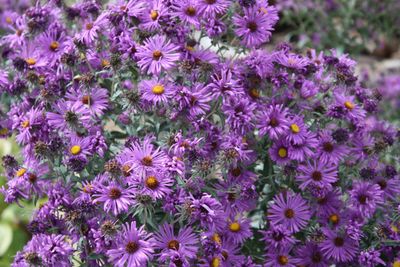Why Use Asters That are Purple?
While purple asters have several different tones, their cool hue sets off numerous other colors. When paired with yellow flowers, the effect is absolutely stunning with the sunny tone blending with the stormy sky hue. When you plant different types of purple aster in a grouping, the effect is jaw dropping. Since purple is one of the “cool colors” on the color wheel, it is supposed to relax you. That makes purple aster flowers an excellent choice for a meditation garden or just a quiet corner of the yard that needs a calming influence. In addition to color selection, asters come in several specific niche varieties, and each has its own characteristics to add to the elegant flowers.
Aromatic asters Calico asters Heart Leaf asters Alpine asters Heath asters Smooth asters Wood asters
Small Purple Aster Varieties
Asters range from 8 inches (20 cm.) to 8 feet (2 m.) tall. The little guys are perfect for containers, borders and planted en masse. Some of the cutest dwarf varieties have compact form but still pack a powerful purple punch. These shorter purple asters are generally in the New York aster group and include:
Wood’s Purple – Semi-double purple flowers with yellow centers Purple Dome – Lavender-purple. Plant forms a small dome or mound Professor Anton Kippenberg – Deeply blue-purple, long-lasting blooms Alpine – Early bloomer Lady in Blue – Sweet light purplish blue blooms Raydon’s Favorite – Fragrant foliage
Tall Asters That are Purple
There are over 200 species commonly sold in the U.S. with more than 400 available in the U.K. The statuesque types of purple aster lend themselves to the backs of perennial beds, containers and as stand-alone specimens.
Tartarian Aster – Lush and thick plant with violet blooms Hella Lacy – Up to 60 inches tall (152 cm.) Bluebird Smooth – A classic purple with yellow centers October Skies – An aromatic aster with small lavender flowers Short’s Aster – Airy foliage and delicate light purple flowers Eventide – Semi-double blooms
A really spectacular architectural specimen is the Climbing aster. It doesn’t really climb but has extremely long stems that grow up to 12 feet (3.6 m.). This extreme aster has purplish pink flowers. It can look spindly over time unless cropped at the end of the season.
